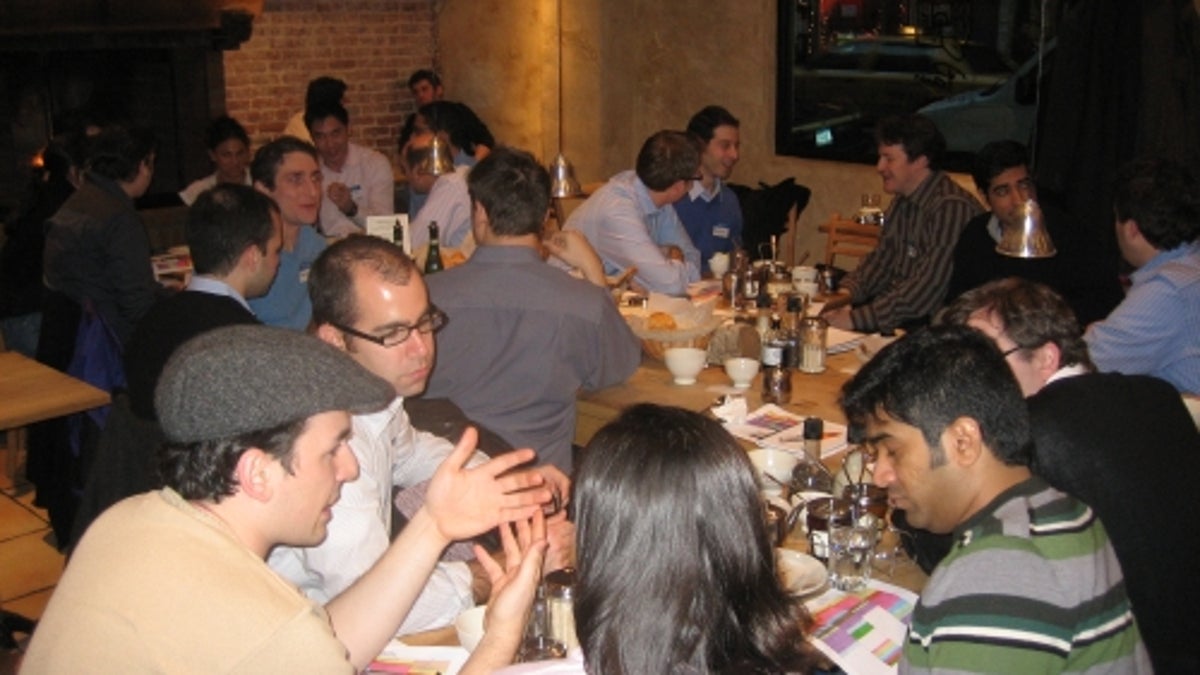Deconstructing the 2007 tech prediction list
New Yorkers talk RSS, advertising, and whether Windows Live is a joke or not.

In between writing about the latest in social media, productivity tools, and all the other varieties of Web apps that the series of tubes is offering these days, I occasionally like to give a shameless plug about what's going on in the tech scene in my home city. After all, Webware is based out of the Bay Area, so as a New Yorker I feel like I have to make my regional voice heard once in a while. There's a great grassroots tech scene here, exemplified in the number of both gatherings--like the NY Tech Meetup, led by Meetup founder Scott Heiferman--where a smattering of entrepreneurs, VCs, advertisers, analysts, and media types pack into a room somewhere and watch presentations by up-and-coming local Web companies, discuss topics that range from trends to predictions to hot-button issues.
The NY Tech Meetup, with monthly attendances often reaching 500 people, is an example of one of the larger and more formal Manhattan tech events. Others, however, are much more spur-of-the-moment, like last Wednesday's gathering of almost 40 people at an Upper East Side coffee shop that was thrown together by local tech entrepreneur Darren Herman, co-founder of in-game advertising start-up IGA Worldwide (among other things), for the purpose of discussing the currently-ubiquitous topic of the 2007 prediction. Topics ranged from advertising to security to mobile technology, but since many of those present were involved in the local Web development and applications scene, a major subject of debate was the future of various components of the Web 2.0 movement that caught fire in 2006.
Here are a few of the webware-related highlights.
User-generated advertisements. This is the phenomenon that hit the mainstream when General Motors launched a contest last spring that encouraged Web users to create their own ads for the Chevy Tahoe with the help of pre-selected scenes, fonts, and music. Problem is, it backfired when the contest began to fill up with Tahoe "advertisements" that charged GM with adding to the global warming problem by producing gas-guzzling SUVs. Despite all that, capitalizing on the Web's appetite for user-generated content is still an appealing prospect for many advertisers. At last week's gathering, opinions were split as to whether user-generated ads would be an emerging (and profitable) phenomenon, or just an overhyped buzzword. The jury's still out on this one.
Widgets. It seems like every blogger's been talking about widgets as something that will get really big in '07. After Apple introduced the customizable Dashboard, with a host of mini-applications that could be selected, arranged, and formatted, other companies took notice. (The Windows Vista equivalents are called "gadgets.") But here's the issue: "widget" has become a buzzword that has exploded beyond its own definition, kind of like "mashup," and at last Wednesday's discussion it became clear that not everyone defines a "widget" the same way. But, hey, if the meaning of "widgets" is already getting blurred, that must mean it'll get overused this year to the point of oblivion. I'm guessing this will consequently be a big one.
Windows Live. It's pretty unclear as to whether Windows Live, Microsoft's suite of Web applications that range from search to e-mail to news aggregation, will shape up to be a legitimate counter to Google or another disappointment out of Redmond. I'm leaning toward the latter. Though I think we should really wait until the impending release of Windows Vista before making judgments about this, my view is that unless Google's recent screw-ups get worse, this won't likely happen.
Peer-to-peer's facelift. In the final weeks of 2006, all eyes were on BitTorrent as the peer-to-peer (P2P) file-sharing software company raised $20 million in venture capital and attracted the attention of major movie studios as an effective business model for online movie distribution. Considering BitTorrent's reputation for facilitating not-so-legal media sharing, this is big news. Plus, P2P has been talked up recently as the secret ingredient in cooking up the ultimate YouTube killer, exemplified by all the recent rumors of the "Venice Project." The thing is, P2P's legal renaissance has been talked about for quite some time now--at Wednesday's event, host Darren Herman had dug up an article that predicted enterprise and big-media adoption of P2P models would happen in...2004. Like many of these "predictions," it's really nothing new.
RSS. Sure, you might be addicted to your NewsGator or Google Reader, but that's not the way most Web users operate. According to Reuters, only two percent of Internet consumers implement Real Simple Syndication (RSS) to keep tabs on what's happening on their favorite sites and blogs. The likely reason? It's just too "techy" of a concept. As a result, some of Wednesday's attendees echoed the prominent '07 prediction that RSS might not catch on, but some kind of simplified feed technology will. Social networking service Facebook has already caught onto this with the notorious News Feed feature. Will we be seeing more "un-RSS" feeds? I'm going to go ahead and say yes. Let's hope they don't create the backlash that the Facebook News Feed did.
Got your own reflections on the myriad 2007 predictions that have been making the rounds for the past month or so? Let us know!

